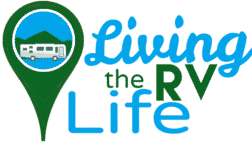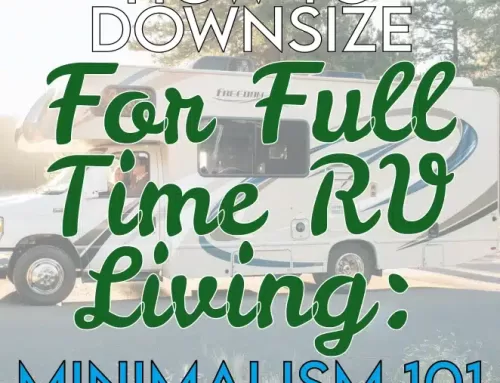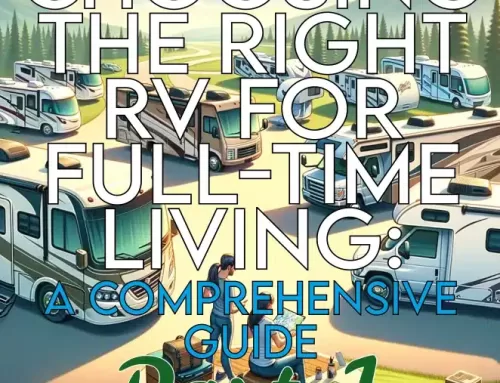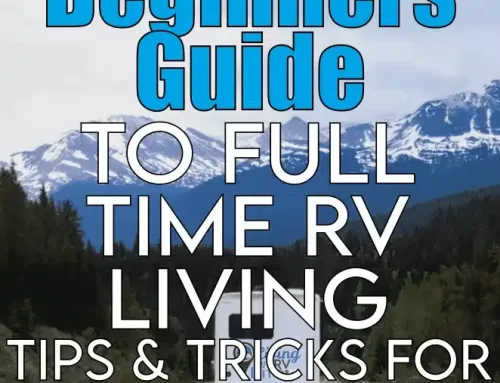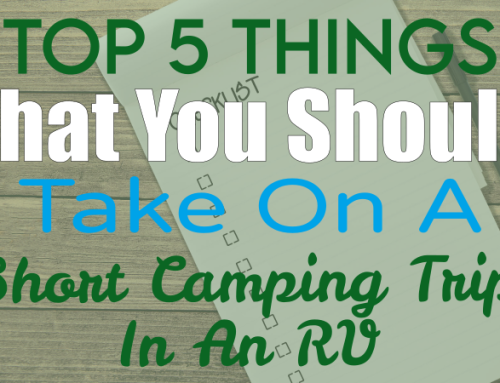Introduction
 If you have read through Part 1 of this 2 part series on Choosing the Right RV for full time living, then you know that covers a wide range of topics, from understanding the different types of RVs to customizing your RV for comfort, as well as navigating the legal and practical concerns associated with living on the road. However, there are more considerations when you decide to live in an RV full time.
If you have read through Part 1 of this 2 part series on Choosing the Right RV for full time living, then you know that covers a wide range of topics, from understanding the different types of RVs to customizing your RV for comfort, as well as navigating the legal and practical concerns associated with living on the road. However, there are more considerations when you decide to live in an RV full time.
In part 2 we look at a few more things like realities and challenges, maintenance, and where to turn for support. All these things can, and do, help make your RV Lifestyle the most fulfilling.
Living in an RV Full-Time: Realities and Challenges
Living full-time in an RV offers a unique and rewarding lifestyle, but it also comes with its own set of realities and challenges. Understanding and preparing for these can help ensure a more enjoyable and sustainable experience.
Dealing with Limited Space
One of the most significant adjustments when moving into an RV is adapting to a smaller living space. Efficient use of space becomes crucial. It often requires downsizing possessions, learning to live with less, and finding creative storage solutions. This limited space can also affect privacy, especially when living with others, necessitating the need for personal time and space management.
Social Aspects and Community
While RV living can offer a great sense of community, especially in campgrounds and RV parks, it can also lead to feelings of isolation, particularly when traveling to remote areas. Staying connected with family and friends via technology is important, as is reaching out to the RV community through online forums and local meetups. Many full-time RVers find a sense of belonging in these traveling communities, sharing experiences and forming lasting friendships.
Coping with Varying Climates
Traveling in an RV means you may encounter a wide range of weather conditions. Being prepared for extreme heat, cold, rain, and snow is essential. This means ensuring your RV is well-insulated, your heating and cooling systems are in good condition, and you have the necessary gear to comfortably live in different climates.
Internet and Connectivity Issues
Reliable internet can be a challenge on the road. Whether you work remotely, stream entertainment, or simply want to stay in touch with loved ones, having a consistent internet connection is vital. Investing in a good mobile hotspot, booster, or satellite internet system is often necessary for full-time RVers.
Maintenance and Repairs
Owning an RV requires regular maintenance and occasional repairs. This can range from simple tasks like checking tire pressure and batteries to more complex issues like plumbing or electrical repairs. Learning basic RV maintenance skills can save time and money, but it’s also important to know when to seek professional help.
Adapting to a Mobile Lifestyle
The nomadic nature of RV living means constantly adapting to new locations, rules, and situations. This can be thrilling but also tiring. Developing routines and finding ways to make each new place feel like home can help in creating a sense of stability.
Financial Management
Managing finances on the road requires careful planning. Budgeting for fuel, campsite fees, maintenance, and unexpected expenses is crucial. Many full-time RVers find ways to work remotely or take on seasonal jobs to support their lifestyle.
Living full-time in an RV is an adventure with its own unique set of challenges and rewards. By understanding and preparing for these realities, you can navigate the challenges effectively and fully embrace the joys of a nomadic RV lifestyle.
Maintaining Your RV
Regular maintenance is crucial to ensure the longevity and safety of your RV. It also plays a significant role in a comfortable and uninterrupted full-time living experience. Here’s a breakdown of key maintenance areas to focus on. These RV tips are on every experienced RVers list:
Regular Maintenance Tips
- Engine and Mechanical Maintenance: Regularly check and maintain the engine, brakes, tires, and other mechanical parts. This includes oil changes, tire rotations, brake inspections, and addressing any unusual noises or behaviors immediately.
- Battery Care: Batteries are the lifeblood of your RV. Ensure they are always charged and in good condition. Regularly clean the terminals and check for signs of wear or leakage.
- Plumbing System: Regularly check your RV’s plumbing system for leaks or blockages. This includes inspecting pipes, the water heater, and the sewage system. Regular flushing and cleaning of the water tanks are necessary to avoid build-up and bacteria growth.
- Electrical System: Inspect the electrical system, including the generator, inverter, and any solar panels. Look out for frayed wires, loose connections, and ensure your electrical system is capable of handling your power needs.
- Roof and Seals: The RV’s roof is prone to damage from exposure to elements. Regularly check for leaks, cracks, and wear. Sealant should be checked and reapplied as needed to prevent water damage.
Handling Repairs on the Road
- Be prepared for potential repairs while on the road. Carrying basic tools and understanding your RV’s mechanics can be invaluable. It’s also useful to have manuals and instructional videos on hand for reference.
- Identify reliable RV repair services and dealers along your route. Joining RV clubs or online communities can provide recommendations for trustworthy services nationwide.
- Consider enrolling in roadside assistance programs specifically designed for RVs. These programs can be lifesavers in the event of a breakdown or other roadside emergencies.
Seasonal Maintenance
- If you’re traveling in different climates, your RV will require seasonal maintenance. Winterizing your RV is crucial for cold climates to prevent freezing and damage. Conversely, preparing your RV for hot summer conditions involves checking the air conditioning system and ensuring proper ventilation and shade.
Keeping a Maintenance Log
- Keeping a detailed log of all maintenance and repairs can help you track the health of your RV over time. This record is also valuable for resale purposes and can provide peace of mind knowing that all systems are up-to-date.
Regular maintenance of your RV is not just about fixing problems; it’s about preventing them. By staying on top of these maintenance tasks, you can ensure that your home on wheels remains safe, reliable, and comfortable for all your adventures.
Resources and Community Support
Adopting a full-time RV lifestyle brings a unique set of challenges and learning curves. Fortunately, there is a wealth of resources and a supportive community available to assist new and experienced RVers alike. Here’s a look at some of these essential resources:
Online Forums and Groups
- Online forums and social media groups are invaluable for connecting with fellow RVers. Platforms like RVillage, iRV2, and specific Facebook groups offer a space to share experiences, seek advice, and learn from others. Whether you need tips on the best routes, advice on RV maintenance, or want to share your travel stories, these communities are incredibly supportive and informative.
Blogs and YouTube Channels
- There are numerous blogs and YouTube channels dedicated to RV living. These can provide real-life insights into the RV lifestyle, including travel guides, DIY maintenance tips, and product reviews. Following RV influencers can also be inspiring and offer practical tips and tricks for living on the road.
Books and Guides
- There is a variety of books and guides on RV living covering a range of topics from RV maintenance, travel guides, to stories of personal RV adventures. These can be excellent resources for both practical advice and inspiration.
RV Workshops and Seminars
- Consider attending RV workshops and seminars. These are often held at RV shows, dealerships, or as part of RV club gatherings. They offer hands-on learning experiences and a chance to ask questions directly to experts.
RV Clubs and Associations
- Joining RV clubs and associations can offer numerous benefits including access to exclusive campgrounds, discounts on RV services, and opportunities to attend rallies and events where you can meet other RV enthusiasts.
Local RV Dealers and Service Centers
- Building a relationship with your local RV dealer or service center can be beneficial. They can offer expert advice, maintenance services, and updates on the latest RV products and accessories.
Apps and Technology
- Utilize technology to enhance your RV experience. There are apps for route planning, finding campgrounds, tracking maintenance, and more. These tools can help simplify the logistics of RV living.
Mentorship and Networking
- Seeking mentorship from experienced RVers can provide you with firsthand knowledge and advice. Networking with other RVers, whether in person or online, can lead to friendships and a support system that can be invaluable on the road.
The RV community is known for its friendliness and willingness to help. Leveraging these resources and becoming a part of the community not only makes the journey easier but also more enjoyable. Whether it’s through digital platforms or in-person meetings, the support and information available can greatly enhance your full-time RV living experience.
Conclusion
As we conclude this comprehensive guide on choosing the right RV for full-time living, it’s important to reflect on the journey you’re about to embark upon. Full-time RV living is not just a change in your living situation, but a transformative experience that offers a unique blend of freedom, adventure, and simplicity.
Selecting the right RV is a critical step in this journey. It’s about finding a balance between comfort, functionality, and affordability. Remember, the best RV for you is one that fits your lifestyle, meets your needs, and feels like a home. Whether you choose a luxurious Class A motorhome or a compact travel trailer, the key is to make an informed decision that enhances your life on the road.
The transition to full-time RV living is both exhilarating and challenging. It requires careful planning, from understanding the legal and practical aspects to maintaining your vehicle and embracing a new community. But with the right mindset and preparation, these challenges can be transformed into rewarding experiences.
Embrace the adventure that comes with living on the road. You’ll have the opportunity to explore new places, meet diverse people, and build a wealth of memories. The freedom to travel and live on your own terms is an unparalleled experience.
As you set out on this adventure, remember that you are part of a vibrant and supportive community of fellow RVers. There’s a wealth of resources, knowledge, and friendship available to help you navigate this lifestyle. Don’t hesitate to reach out, share your experiences, and learn from others.
In conclusion, full-time RV living is more than a choice of residence; it’s a lifestyle choice that offers endless opportunities for growth, exploration, and discovery. With the right RV, a spirit of adventure, and a supportive community, you are well-equipped to enjoy the journey and the many destinations along the way.
Safe travels and happy RVing!
